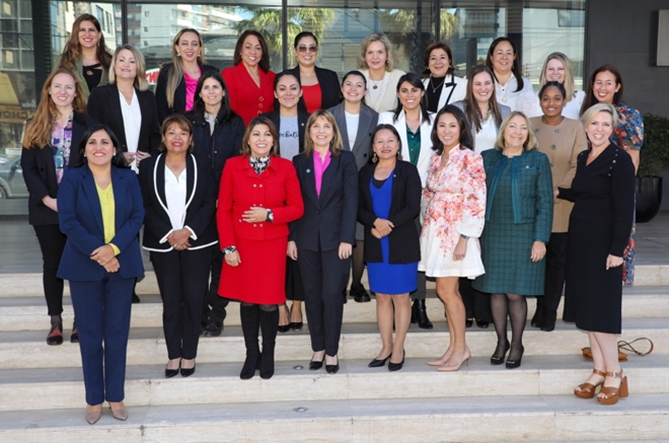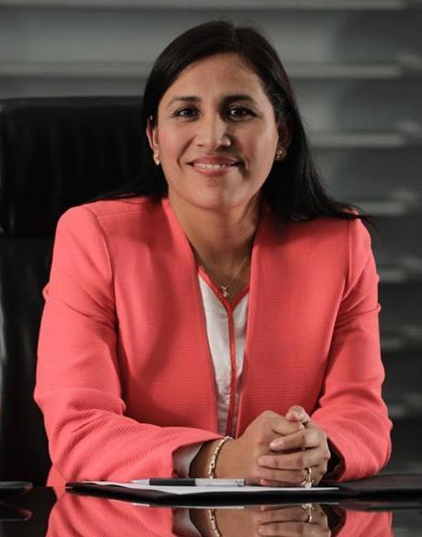
The House Democracy Partnership (HDP) is a bipartisan commission of the U.S. House of Representatives that works directly with over 20 partner parliaments around the world to support the development of effective, independent, and responsive legislatures. HDP is proudly implemented by the International Republican Institute (IRI) and the National Democratic Institute (NDI).
In this month’s alumni profile, the Honorable Flor Pablo Medina, a Member of the Congress of the Republic of Perú, shares her experience participating in HDP programming.

What parliament and chamber are you a member of?
I am a congresswoman of the Congress of the Republic of Perú, which has only one chamber.
What HDP program did you participate in?
I participated in the regional exchange “Women’s Economic Empowerment Legislative Forum,” organized by HDP in collaboration with the Women’s Democracy Network and IRI’s Latin America and Caribbean Division.
What do you want other people to know about your country?
Peru is a fascinating country because of its cultural, ethnic, ecological, geographic, and gastronomic diversity. Our coastal, Andean, and Amazonian regions make Peru a unique place worth visiting. Peru has a millenary historical legacy with impressive archaeological sites, among which the citadel of Machu Picchu stands out and is considered a wonder of the world and a world heritage site. Peru’s greatest wealth is our people and the daily drive of Peruvian men and women to provide for their families. In recent years, as a result of the pandemic, the economic crisis, the dismantling of reforms, and the polarization and absence of political consensus, Peru’s democratic institutions have been weakened.
I hope that, from the constitution of a political space of democratic center, we can recover, through democratic and institutional ways; the course of development and democracy in Peru. Our great challenge is to confront corruption, deep inequalities, and the increase in poverty.
Why did you decide to become a member of parliament?
Congress is a fundamental institution to serve Peruvians. My life story has had a common thread, which is to work for others, always understanding education as the great social equalizer and democracy as the way in which we can achieve the desired life project of each person. Therefore, I focus my parliamentary work on education, guaranteeing the rights of vulnerable people, and institutional strengthening through political reforms. In this sense, the service for my country and my vocation to bring to the national representation the voice of those who are not heard, have been my main motivations to work in Congress.
Looking back on the HDP program, what was most impactful for you?
The economic perspective behind gender asymmetries has been very interesting. Usually, the approach to the problem is approached from the right to equality and non-discrimination mandate, but this forum highlighted a variable that also requires special attention: how gender inequality has a negative impact on emerging economies such as Peru. In addition, a central element discussed was the inversely proportional relationship of women’s economic independence with gender-based violence. Finally, an issue that I bring to Peru is the urgency of implementing a national care system.
How are you applying your experience from the HDP mission to your role as a member of parliament?
The experience has been enriching in content and policy practices. The constitutionalization of the right to care, the implementation of the care system, the prohibition of child marriage, as well as early unions, and addressing the issue of gender inequalities from a social and economic perspective, have been the main issues that I will continue to promote from my work as a parliamentarian and that were duly addressed in the forum.
What information, if any, that you gained through the HDP program have you shared with fellow members of parliament?
I shared the experiences of other countries, their progress and setbacks regarding the empowerment of women and girls. I have also made it known that this is a regional problem and that there are many points in common about the realities we live in. For this reason, it has been essential to learn about comparative experiences and the strategies followed in different countries to achieve greater equality of opportunity between men and women. I reiterate, the topic that I have shared the most upon my return was the importance of creating a national care system in Peru, which will contribute to closing gaps between men and women, as well as contributing to the country’s GDP and economic development.
What advice would you give to new members of parliament?
Always work bearing in mind that we are at the service of Peruvians and that the positions are transitory, but that along the way they should give their best to make an impact on the lives of the people. Likewise, it is essential to maintain coherence at the level of principles and never take personal advantage of public work. Finally, I would tell them that they have the great responsibility, based on their work, to make Peruvians feel once again well represented and that Congress can be seen as an institution at the service of others.
What accomplishments in parliament are you most proud of?
As soon as I took office, I proposed the creation of a Special Multiparty Commission for the protection of children, which was approved and is still working after two years. In addition, from this Commission I promoted a normative proposal in favor of orphaned children, so that they receive economic assistance and comprehensive support in their life trajectories, and today more than 55,000 children are benefiting from this Law. At the educational level, a law was passed that I promoted to strengthen a management career in basic education institutions and I have defended the university reform, which is currently being completely weakened, as well as meritocracy in the teaching career, to have the best schools and achieve learning we need the best teachers and they must be evaluated. In Congress, I was able to have the Regulations modified so that there are interpreters of native languages.
Recently, an initiative of my authorship has been approved in Congress related to the prohibition of child marriage in Peru, putting an end to a harmful practice that violated the rights of girls and adolescents. This law represents an important step in the defense of girls’ rights, giving them the opportunity to reach their full potential and to live in safe environments, free from violence, protecting them from rape and forced pregnancies.
Top